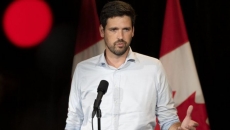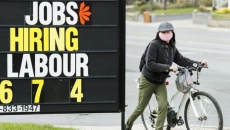Liberals and New Democrats appear to be inching closer to an agreement on proposed pharmacare legislation, but a national drug plan may be farther out of reach than ever after this week's federal fiscal update.
The Liberals promised to table and pass the legislation by the end of the year as part of a supply-and-confidence deal, in which the NDP is supporting the minority government on key votes in exchange for progress on shared priorities.
It is now nearly impossible for a bill to pass before the holiday break, which begins in just three weeks.
But the NDP appears to be willing to offer some wiggle room on the terms of the deal if it means the Liberals table a plan for a universal, single-payer drug program.
"We are more interested in making sure we do this right, and so far, we're moving in the right direction," NDP Leader Jagmeet Singh said Wednesday.
"But we're going to be resolute and firm on that protection of Canadians."
The negotiations are taking place as Ottawa pledges to install new fiscal guardrails that would keep deficits below one per cent of gross domestic product beginning in the 2026-2027 financial year.
Health Minister Mark Holland suggested on Wednesday that the economic climate is one of the reasons negotiations with the NDP are taking so long.
"There's a lot of dynamic factors to consider, and we want to make sure that it's right," he said.
Finance Minister Chrystia Freeland released a fall economic statement on Tuesday that outlined how little room the government will have to spend on big new programs until 2027 at the earliest.
That's the first year the government currently expects to post a deficit that is smaller than one per cent of projected GDP.
Pharmacare did not merit a mention in the government's budget update, but that doesn't come as a surprise.
The legislation won't necessarily commit the government to actually launch a national pharmacare plan, so it doesn't need to cost the government anything in the short term, said Marcel Saulnier, an associate with Santis Health.
"I think the financial constraints right now are very significant and the political issues, both federally and between the feds and the provinces, make it challenging," said Saulnier, who served as executive director for an advisory committee on the implementation of national pharmacare in 2018.
"I would imagine that they would be aiming to create something that looks more like a framework, that doesn't necessarily have any money attached to it."
Still, legislation alone won't make prescription drugs any more available without additional federal investment, and he worries the financial bind could prevent that from happening.
The parliamentary budget officer estimates that universal, single-payer pharmacare would cost the public sector an estimated additional $11.2 billion if it were fully implemented next year, and that would increase to $13.4 billion in 2027-2028.
The PBO also found there would be economy-wide savings of $1.4 billion next year if such a program were implemented, rising to $2.2 billion in 2027-2028, thanks to the improved purchasing power of a single-payer system.
Scotiabank economist Rebekah Young is skeptical there's enough fiscal room in the public purse for the added expense, unless the economic outlook changes.
"The path they've set out doesn't build in room for a full-blown pharmacare program," Young said in an interview on Thursday.
"Maybe they go back to the drawing board and look at, if we can't afford a universal pharma, what's the next best thing?"
The Liberals promised to establish pharmacare during the 2019 election campaign, and have taken some steps toward realizing that promise.
The government appointed a transition office to create a Canadian Drug Agency and launched a national strategy for drugs to treat rare diseases.
Singh accused the Liberals of bringing a first draft of the legislation to their New Democrat dance partners that favoured pharmaceutical companies. He said he would reject anything that did not make a commitment to a single-payer system.
That commitment was solidified in October when the party's members passed an emergency resolution at their policy convention that urged the NDP to withdraw support from the supply-and-confidence deal if the Liberals do not commit to "a universal, comprehensive and entirely public pharmacare program."
If the government is intent on securing a deal with the NDP, it could always abandon the fiscal restraints it committed to this week, as it has in the past, Lakehead University economics professor Livio Di Matteo said.
"Most government spending plans (in) Canada at the federal level have not been limited by any deficit. They usually set guardrails and then exceed them anyway," said Di Matteo, who specializes in health economics and public finance.
Canadians will learn more about how much the initiative could cost when legislation is finally tabled in the House of Commons.
The House is expected to rise for a holiday break on Dec. 15.
In a statement, Holland's press secretary Chris Aoun said the minister's goal remains to table the Liberals' pharmacare legislation this year.






